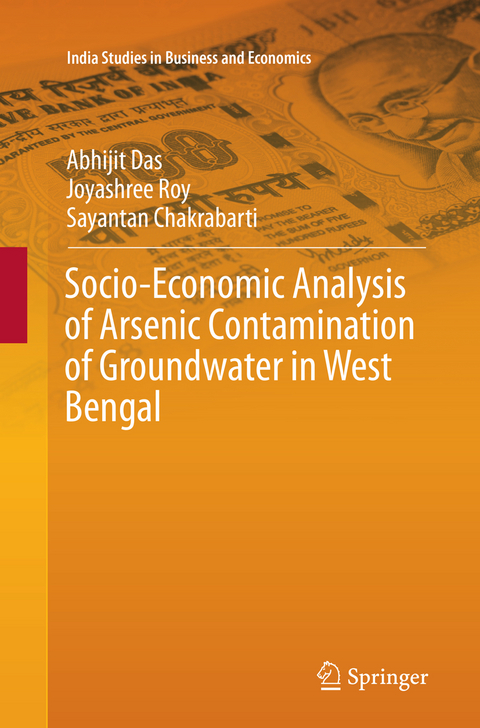
Socio-Economic Analysis of Arsenic Contamination of Groundwater in West Bengal
Springer Verlag, Singapore
978-981-10-9227-5 (ISBN)
Dr. Abhijit Das is currently an Assistant Professor in Economics at Vijoygarh Jyotish Ray College in Kolkata, West Bengal (India). He has been researching extensively over past one decade in the various villages of rural West Bengal to understand the social, economic and political issues that drives lack of access to safe drinking water. His field research has been primarily funded by University Grants Commission of Government of India. He has published more than 15 peer reviewed articles. Dr. Joyashree Roy, Professor of Economics, coordinates the Global Change Programme and also directs Ryoichi Sasakawa Young Leaders Fellowship Fund Project at the Jadavpur University. She is in the 2007 Nobel Peace Prize winning panel –IPCC (Intergovernmental Panel on Climate Change). She has been involved in preparation of Stern Review Report, Global Energy Assessment and many other national and global reports. She has published morethan 80 peer reviewed articles. She is researching in this area for more than two decades. Sayantan Chakrabarti is a development communication consultant. Few of his notable projects, till date, are ‘LIFE / DEATH’ – a documentary film on the arsenic crisis; ‘Commons’ – a multi-media communication series explaining the idea and necessity of Commons; ‘Dhumil Hota Astitva’ – a film highlighting the impact of environmental pollution on heritage; ‘Mother Anonymous’ – addressing the plight of surrogate mothers; ‘Buy Buy King’ – exploring lack of consumer choice; ‘Harit Lehar’ – explaining the need of composting as a sustainable method of waste management. He also assisted Dr. Rohit Jigyasu for the paper ‘Appropriate technology for post-disaster reconstruction’ in the book ‘Rebuilding after disasters from emergency to sustainability’, published by Taylor and Francis in 2009.
Chapter 1. The Plight.- Chapter 2. How much is too much?.- Chapter 3. Right to water.- Chapter 4. The shades of suffering.- Chapter 5. Are we 'learning from doing'?.- Chapter 6. Who served the poison?.- Chapter 7. In love with the ‘Devil’s Water’.- Chapter 8. The assassin on the move.- Chapter 9. Malignant intentions.- Chapter 10. The opening of the Pandora’s Box.- Chapter 11. Spilling the beans.- Chapter 12. Threats to Sustainability.- Chapter 13. The Value of Human Life.- Chapter 14. Pricing the Life?.- Chapter 15. A catastrophe sans border.
| Erscheinungsdatum | 20.07.2018 |
|---|---|
| Reihe/Serie | India Studies in Business and Economics |
| Zusatzinfo | 1 Illustrations, color; 8 Illustrations, black and white; XXI, 136 p. 9 illus., 1 illus. in color. |
| Verlagsort | Singapore |
| Sprache | englisch |
| Maße | 155 x 235 mm |
| Themenwelt | Naturwissenschaften ► Biologie ► Ökologie / Naturschutz |
| Naturwissenschaften ► Geowissenschaften ► Hydrologie / Ozeanografie | |
| Technik ► Umwelttechnik / Biotechnologie | |
| Wirtschaft ► Volkswirtschaftslehre | |
| ISBN-10 | 981-10-9227-3 / 9811092273 |
| ISBN-13 | 978-981-10-9227-5 / 9789811092275 |
| Zustand | Neuware |
| Haben Sie eine Frage zum Produkt? |
aus dem Bereich


